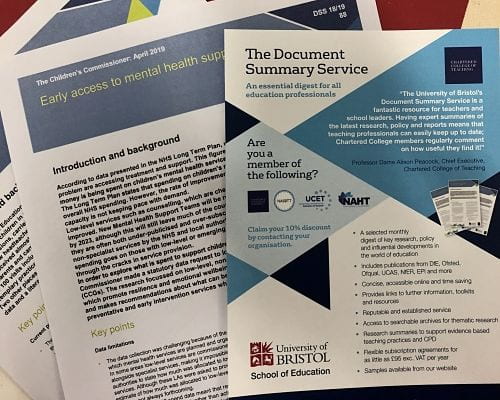
Blog post by Helen Aberdeen, Director of the Document Summary Service & Bristol Guide, School of Education, University of Bristol.
Now we are well into 2020 and spring is in our sights, it is a good time not just to look forward, but also to take stock of the year which has gone.
One of the things which I like to do as Director of the Document Summary Service here at the University of Bristol is to take a look at the ‘Top ten’ – i.e. the summaries which had the most downloads from our subscribers over the last year. If you are a subscriber, it may be interesting to see if your interests align with those of the subscriber community as a whole. If you are not yet a subscriber, I hope that this overview will give you a flavour of the wide-ranging scope of the summaries and tempt you to join us in 2020.
Ofsted tops the charts with 3 reports hitting the Top Ten. In January 2019, the new education inspection framework was published, heralding a bright(?) new era of inspections. The underlying principle of the new framework was that inspection should reflect how schools operate on a daily basis, not just on inspection day. Key changes included new judgements on personal development and on behaviour and attitudes. The major change, however, was a broadening of the judgement on quality of teaching, learning and assessment to specifically include curriculum quality.
Inspectors will now look at 3 distinct aspects of curriculum: intent (what schools want for their children); implementation (what is taught and assessed to fulfil the intent); and impact (what are the outcomes for children and to where do they progress?) I am sure that the intent-implementation-impact mantra will grace many staffrooms this year!
The theme of curriculum was further explored in an Ofsted report ‘Assessing the quality of education through curriculum intent, implementation and impact’, which was published in December 2018 and made it into the January 2019 summaries. This report detailed Ofsted’s research into the best ways of assessing curriculum quality – a fascinating read. A further Ofsted Top Ten report, ‘Inspecting education quality: lesson observation and workbook scrutiny’, was published in June 2019 and included in the July summaries. This report looked at work undertaken by Ofsted to establish the best ways of observing lessons and scrutinising pupils’ work.
Two reports related to pupil disadvantage made it into the Top Ten. The first of these was an insightful DfE report ‘Research to understand successful approaches to supporting the most academically able disadvantaged pupils’, which did what it said on the tin, The second was a Sutton Trust report ‘School funding and Pupil Premium’, which reported on research into how schools use Pupil Premium funding and on what they base their decisions.
Another key area of subscriber interest is wellbeing and mental health. There have been an increasing number of reports covering this area, 3 of which made it into the Top Ten. The ‘Children’s Mental Health Briefing’, was published by the Children’s Commissioner at the end of 2018. It gave a comprehensive overview of the state of Children’s Community Child and Adolescent Mental Health Services (CAMHS) across England – somewhat depressing albeit highly informative. The ‘Impact of Social Media and Screen Use on Young People’s Health’, published in January by the House of Commons Science and Technology Committee was another Top Ten read for subscribers. I wonder if any subscribers downloaded the accompanying teachers’ pack which was mentioned in the report.
A third report in the Top Ten which I include under the mental health theme was ‘Understanding Mathematics Anxiety’, published by the Nuffield Foundation and the University of Cambridge. An in-depth look at the anxiety, apprehension, tension nor discomfort felt by some individuals when confronted with maths – a must-read for maths teachers!
Teacher workload is, unsurprisingly, an area of considerable interest for those of you at the coal face. The annual ‘Teacher Workload Survey 2019’, published by the DfE in September was in 7th place in the summary charts. Some good tidings in this report with teachers reporting spending less time on planning, marking and inputting data!
Another issue of considerable relevance to those at the coal face is the issue of pupil behaviour. The EEF’s Guidance report on ‘Improving Behaviour in Schools’, with its 6 key recommendations was a popular read, in 4th place in the download charts.
As another year begins, I am currently engaged in tracking down summaries for the first batch of the new decade! We do aim to be responsive and, as I sit alone in an office writing these summaries, feedback from subscribers is always very welcome, as are suggestions about reports which have come out and which you think may be of interest.
Do follow us on Twitter in 2020 @BristolUniDocs – and look out for exciting changes to the service coming soon!
